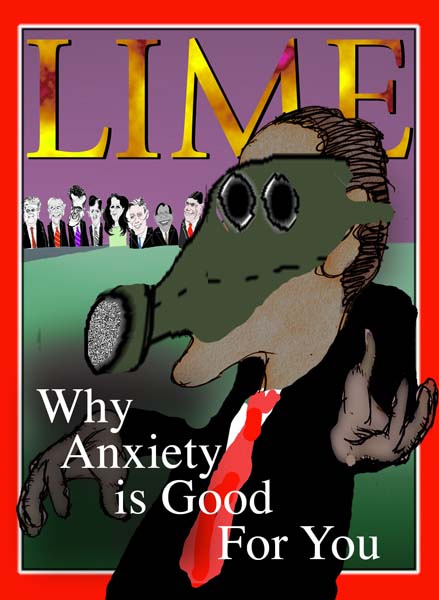Search
Recent comments
- stenography.....
14 hours 7 min ago - black....
14 hours 5 min ago - concessions.....
15 hours 6 min ago - starmerring....
19 hours 11 min ago - unreal estates....
22 hours 58 min ago - nuke tests....
23 hours 1 min ago - negotiations....
23 hours 4 min ago - struth....
1 day 12 hours ago - earth....
1 day 13 hours ago - sordid....
1 day 13 hours ago
Democracy Links
Member's Off-site Blogs
one size does not fit all...

From the dawn of the colonial era, long before they even had a national identity, Americans have always felt they had a special role in the world, though the exact nature of American exceptionalism has always been a matter of some dispute.
Many have taken it to be a special religious destiny, but Alexis de Tocqueville, the first to consider it systematically, affirmed the exact opposite: "a thousand special causes ... have singularly concurred to fix the mind of the American upon purely practical objects." Ironically enough, the exact term "American exceptionalism" was first used by Joseph Stalin, in order to reject it.
And yet, for 70 years American exceptionalism has been most prominently and consistently associated with imperialism ("benevolent", of course!), via the phrase "the American Century". It was coined by Time-Life publisher Henry Luce in February, 1941, 10 months before Japan's Pearl Harbour attack drew the US into World War II. The history of Luce's coinage provides a depth of resonance for a recent twist: a not uncommon, but particularly telling juxtaposition of four Time magazine covers from around the world this week.
In three editions - Europe, Asia and South Pacific - Time magazine's visually hot, tumultuous cover featured a gasmask-protected Egyptian protester, upraised fist overhead with a chaotic street background behind. The headline: "Revolution Redux". Not so in the exceptional American edition. There, the visually cool, wanna-be New Yorker-ish cover was a text-dominated cartoon against a light gray background: "Why Anxiety is Good For You."
http://www.aljazeera.com/indepth/opinion/2011/11/2011112995048821377.html
- By Gus Leonisky at 1 Dec 2011 - 1:24pm
- Gus Leonisky's blog
- Login or register to post comments
keep off the grass...
Democratic mayors to the 99 per cent
In the US, the message from the mayors is simple: You've made your point. Now go to your room and shut up. We've got a lawn to keep up, and you've spoiled it. America's "grown-ups" as the political class likes to think of itself, have never had much patience when it comes to the "children", as its mere citizens are known. And yet, America's democratic revolutionary origins are at the very centre of a radically different vision of what American exceptionalism is all about.
http://www.aljazeera.com/indepth/opinion/2011/11/2011112995048821377.html
Naomi Wolf serves it back
Naomi Wolf serves it back
What a firestorm my Comment is free blog post in the Guardian, "The Shocking News Behind the Crackdown on Occupy", has unleashed: some have praised, while others have attacked. Joshua Holland's criticisms of my piece, in a blog post, "Naomi Wolf's Shocking Truth about Occupy is Anything But", was picked up the most widely of the critics' attacks. But the criticisms Holland poses are poorly grounded.
Holland's main premise is that I am part of a "flurry of speculation" that is without basis in fact, and that there was no federal involvement in the crackdown. I cited evidence that DHS was on the 18-member conference call of mayors, which Oakland Mayor Jean Quan alluded to in an interview with the BBC on 15 November, and my source was Wonkette on 15 November. Holland argues that his assertion to contrary has been qualified, and I am happy to adjust the citation accordingly.
But Holland is seriously mistaken in reaching his premature conclusion that there is no evidence of DHS or federal participation in the crackdown, and for attacking me for having asserted the connection: "Mayors in a handful of cities," he concludes, "responding to local political pressures, decided to break up their local occupations – decisions that were announced to the press well in advance – and were advised as to how best to do so."
He is wrong on many counts. My evidence for federal coordination with local police exceeds the Wonkette citation, which was not, in fact, the basis of my confidence in writing about this coordination in the crackdown. I relied, rather, on many other sources of evidence. Among them, I was relying on what NYPD told me itself. I am certain that NYPD coordinates with federal authorities in OWS-related arrests because an NYPD official informed me that they did so through the bars of my cell, as part of his formal warning to me before my release, apparently to deter me from activities that might result in my rearrest. As I reported in the Guardian on 19 October 2011, part of the seventh precinct sergeant's caution to me about what could happen to me if I was arrested again, if I "rejoined [my] friends the protesters", was a threat based on his assertion of federal coordination with the arrests. He told me that in a second arrest, I would be photographed and fingerprinted, and the data fed into a federal database, to follow me forever. My partner, Avram Ludwig, confirmed that he was given the same warning about his data being fed into a federal database in the event of a future arrest.
Holland is more dangerously wrong in insisting on his conclusion of merely local police response – without reporting on what DHS is doing right now in response to the FOIA requests by many organisations about its possible involvement in the OWS crackdown.